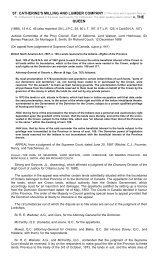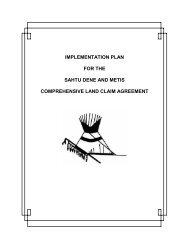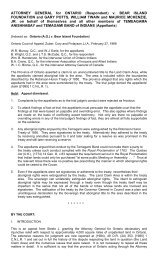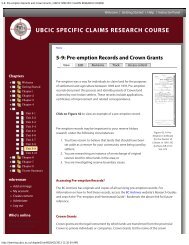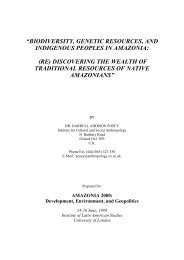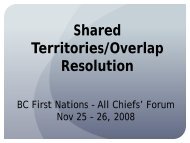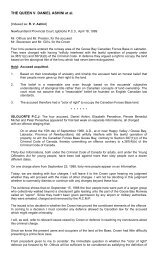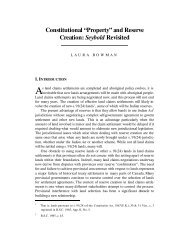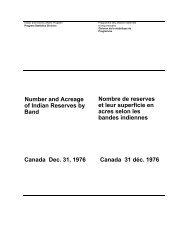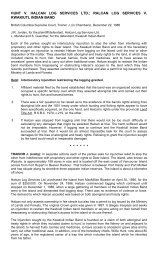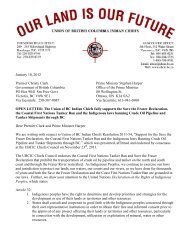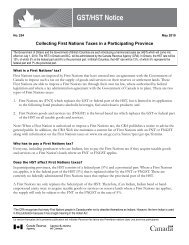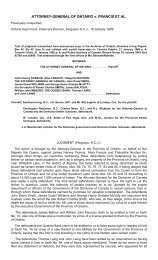Case Summary Wewaykum Indian Band v. Canada (2002)
Case Summary Wewaykum Indian Band v. Canada (2002)
Case Summary Wewaykum Indian Band v. Canada (2002)
You also want an ePaper? Increase the reach of your titles
YUMPU automatically turns print PDFs into web optimized ePapers that Google loves.
- 4 -not identify a particular “band” for whom the reserves were recommended, referring simply tothe “Laich-kwil-tach (Euclataw) <strong>Indian</strong>s”.It was not until the publication of the <strong>Indian</strong> Reserve Schedule in 1902 that there wasanything which purported to assign the reserves to a particular “band”. On this Schedule bothI.R. Nos. 11 and 12 were listed as belonging to the “Wewayakay” or Cape Mudge <strong>Band</strong>. TheCourt accepted the conclusion of the trial judge that this listing was simply an error. 4 In fact thepeople of the Cape Mudge <strong>Band</strong> had never lived on the lands designated as I.R. No. 11. TheCourt found that the wording of the Schedule was not sufficient to create or alter the legalrelationship of the <strong>Band</strong> to the land when it did not accord with government intention, the actualsituation on the ground, or the understanding of the <strong>Indian</strong>s themselves.Appearance of the band name on an <strong>Indian</strong> Affairs documents usedfor administrative purposes does not create in law a reserve in theirfavour, particularly where the document is based on erroneousinformation. (para. 33)The respective interests of the two <strong>Band</strong>s and their members in I.R Nos. 11 and 12 hadbeen the subject of discussion on a number of occasions prior to the commencement of the courtcase. In 1896 the <strong>Indian</strong> Agent reported that:… the <strong>Indian</strong>s of the We’Wai-Ai’Kai [Cape Mudge] band whoreside on the Reserve at Cape Mudge say they had alwaysconsidered the Reserves at Campbell River to belong to ChiefKwaksista [Quacksister], and they did not claim any of it. (quotedat para. 34)A dispute over access to fishery in 1905 lead to a <strong>Band</strong> Council Resolution in March of1907 in which the “…Cape Mudge <strong>Band</strong> ceded to the Campbell River <strong>Band</strong> any claim toReserve No. 11, subject to retaining fishing rights in the area.” (para. 37) While the 1907Resolution could not constitute a “surrender” under the <strong>Indian</strong> Act, this was not fatal because the4The trial judge was Mr. Justice Teitelbaum. After 80 days of evidence and legal argument, he delivered a275-page trial judgment: (1995), 99 F.T.R. 1. The trial judge’s findings of fact were not successfully challengedbefore the Federal Court of Appeal: (1999), 247 N.R. 350.Mandell Pinder December 9, <strong>2002</strong>
- 6 -compensation for the loss of one or the other of the reserves was based on technicalities. Forexample, Binnie J. stated that the argument advanced by the Campbell River <strong>Band</strong> was based on:…an overly technical attempt to rely on what it conceives to be‘the letter of the law’. This, I think, is unfortunate. Our Court hason several occasions emphasized that in dealing with the <strong>Indian</strong>interest in reserves, ‘we must ensure that form not trumpsubstance’ … or allow the true intention of the parties to befrustrated by ‘technical’ rules embodied in the common law…(para. 43)The Fiduciary Duty and its Contentaffirms that:After a review of the principles of fiduciary duty set out in Guerin and Sparrow the Court…potential relief by way of fiduciary remedies is not limited to thes. 35 rights (Sparrow) or existing reserves (Guerin). The fiduciaryduty, where it exists is called into existence to facilitatesupervision of the high degree of discretionary control graduallyassumed by the Crown over the lives of aboriginal peoples….(para. 79)This sui generis relationship had its positive aspects in protectingthe interests of aboriginal peoples historically [the RoyalProclamation]… but the degree of economic, social andproprietary control and discretion asserted by the Crown also leftaboriginal populations vulnerable to the risks of governmentmisconduct or ineptitude. The importance of such discretionarycontrol as a basic ingredient in a fiduciary relationship… [isaffirmed]. (para. 80)Thus the Court affirms the broad nature of the Crown’s fiduciary obligations andconfirms that the courts remain available to give redress when those obligations are breached.However, “there are limits”. The Crown’s fiduciary duty is not “…a source of plenary Crownliability covering all aspects of the Crown-<strong>Indian</strong> band relationship.” (para. 81).Mandell Pinder December 9, <strong>2002</strong>
- 8 -<strong>Band</strong>. It would certainly be in the interests of fairness for theCrown to take into consideration in any future negotiations the factthat the Ross River <strong>Band</strong> has occupied these lands for almost half acentury. (para. 88, quoting from Ross River)Once the Crown has recognized the <strong>Indian</strong>s’ right to occupy and use particular lands afiduciary duty may arise, notwithstanding that a reserve under the <strong>Indian</strong> Act has not yet beenestablished:It cannot reasonably be considered that the Crown owed nofiduciary duty during this period [1878 to 1928 [sic.]] to bandswhich had not only gone into occupation of provisional reserves,but were also entirely dependent on the Crown to see the reservecreationprocess through to completion. (para. 89)The nature of the Crown’s obligations on the facts of this case includes the fact that these<strong>Band</strong>s claimed no aboriginal title to the area. Accordingly, in this case the federal Crown wasnot concerned with:…the disposition of an existing <strong>Indian</strong> interest in the subject lands,but the creation of an altogether new interest in lands to which the<strong>Indian</strong>s made no prior claim by way of treaty or aboriginal right.(at para. 91)Nevertheless, the relationship which the Crown assumed towards the <strong>Band</strong>s gave rise tofiduciary obligationsThe starting point in this analysis, therefore, is the <strong>Indian</strong> bands’interest in specific lands that were subject to the reserve-creationprocess for their benefit, and in relation to which the Crownconstituted itself the exclusive intermediary with the province.(para. 93)Mandell Pinder December 9, <strong>2002</strong>
- 9 -In sum the Court concludes that simply by undertaking to allocate lands for the <strong>Band</strong>s,the Crown did come under some form of fiduciary obligations. The exact extent of thoseobligations will vary but the Court finds that, on the facts of this case, they were fulfilled:While the reserves were not constituted, as a matter of law, until1938, I would be prepared to assume that, for purposes of thisargument, the fiduciary duty was in effect in 1907. [The date of the‘quit claim’ Resolution by Cape Mudge]… Taken in context, andlooking at the substance rather than the form of what was intended,the 1907 Resolution was not in the least exploitative. (para. 102)…the trial judge and the Federal Court of Appeal adopted, withrespect, too restricted a view of the content of the fiduciary dutyowed by the Crown to the <strong>Indian</strong> bands with respect to theirexisting quasi-proprietary interest in their respective reserves…With respect, the role of honest referee does not exhaust theCrown’s fiduciary obligation here. The Crown could not, merelyby invoking competing interests, shirk its fiduciary duty. TheCrown was obliged to preserve and protect each band’s legalinterest in the reserve which, on a true interpretation of events, hadbeen allocated to it. In my view it did so. (para. 104)LimitationsA very damaging aspect of the Court’s judgment is its application of the limitationlegislation, and the equitable doctrines of laches and acquiescence, to hold that even if the <strong>Band</strong>shad a claim on the merits, it was extinguished long before the case was commenced. In sum theCourt finds that waiver of a claim, or “…representations and failure to assert ‘rights’” mayconstitute laches which will bar aboriginal claimants from pursuing a case in court.Further, by incorporation by reference through the Federal Court Act, the provincialstatute of limitations apply “as federal law” to claims and may, therefore, extinguish even claimsto land. Rejecting the claims that such a result was unfair, the Court found that limitations areappropriate because:Witnesses are no longer available, historical documents are lostand difficult to contextualize, and expectations of fair practiceschange. Evolving standards of conduct and new standards ofMandell Pinder December 9, <strong>2002</strong>
- 10 -liability eventually make it unfair to judge actions of the past bythe standards of today. (para. 121)Taken to its logical conclusion, such an approach might mean that aboriginal claimsbased on past conduct would never be successful because that conduct was viewed as appropriateat the time it was undertaken. However, the Court goes on to say that “… historical grievancesshould not be ignored,” nor does “injustice lose its sting with the passage of years.” (para. 123)This sets up a tension which the Court does not resolve except to conclude that it is fair in thiscase where the <strong>Band</strong>s were aware of the facts and had independent legal advice at least by the1930s.Conclusion and ImplicationsA close reading of the facts of this case is important. The two <strong>Band</strong>s were in a disputewith each other over possession of two reserves. The claim for the land did not reflect the actualuse and occupation by the <strong>Band</strong>, but instead relied on errors contained in DIA documents andnow, nearly 60 years later, each <strong>Band</strong> claimed to be entitled to both reserves. The <strong>Band</strong>s did notseek remedies from each other but sought compensation from <strong>Canada</strong> for breach of fiduciaryduty.In reaching the result on these facts, the Court has expanded on existing law in a mannerwhich cuts both ways. The Court has clearly stated that there are limits to the extent of theCrown’s fiduciary obligations and liability to <strong>Indian</strong> people. No doubt this will be seized uponby the Crown to deny a wide range of claims. That being said, the Court has not in any waybacked away from its earlier rulings on the nature of the relationship between the Crown and<strong>Indian</strong> people. It is fiduciary in nature.The Court has also clearly stated that the Crown’s fiduciary obligations are not limited toeither rights protected under section 35 of the Constitution Act, or rights recognized under the<strong>Indian</strong> Act.With respect to reserves, the Court affirmed that as a basic principle the Crown does owea number of obligations to <strong>Indian</strong> people during various phases of the reserve establishmentMandell Pinder December 9, <strong>2002</strong>
- 11 -process. 5 Further, as suggested in Ross River the Crown may have a fiduciary obligation toprotect particular lands either because of a <strong>Band</strong>’s historic use and occupation of those lands orbecause of particular undertakings made by the Crown and its agents. Moreover, from this case,we can assume that the nature of the Crown’s fiduciary obligations would be different, and moreextensive, where the <strong>Indian</strong> people do claim a pre-existing legal interest in the lands by way oftreaty or aboriginal title. The description of those obligations where aboriginal title lands areinvolved may have to await another court case.For specific claims purposes it is clear that the emphasis must be on claims which raiseissues of substantive justice, rather than technical compliance with a statute. The Crown’sfiduciary duties do not exist at large, but are in relation to specific <strong>Indian</strong> interests. The dutiesvary with the nature and importance of the interest to be protected. While the facts of each claimhave always been important, the specific facts of each claim now take on added significance.Fiduciary obligations are shaped by the demands of each situation. Just as the courts have saidthat the existence of aboriginal rights depends on the factual evidence put forward in support ofthe rights, so too the existence of the Crown’s fiduciary duty will depend on the factual evidenceput forward to support imposing a fiduciary obligation on the Crown.It will also be important for <strong>Band</strong>s pursuing claims to come to grips with the limitationsissue. Unless limitation periods on the underlying claims have already expired, <strong>Band</strong>s may wishto carefully consider filing legal action to protect limitation periods in the event that claims arenot resolved through the specific claims process.5For example, O’Reilly’s duty in 1886 “…was to ascertain reserves on the basis of the places [the <strong>Indian</strong>s]wish to have.” (para. 65)Mandell Pinder December 9, <strong>2002</strong>



